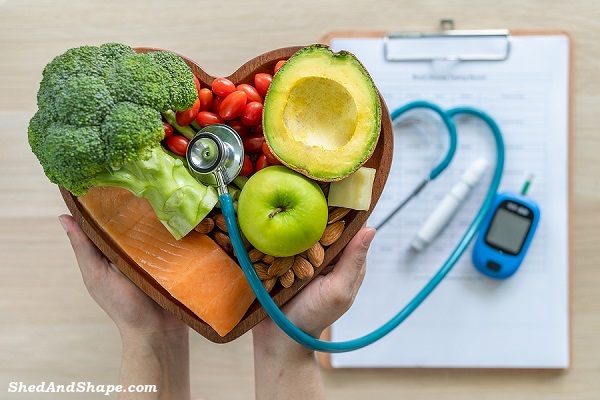If you’ve been asking “Is keto bad for your heart?” after seeing a flurry of articles appearing online recently regarding some new research you are not alone.
A recent study done on the keto diet has claimed that the diet could lead to various heart problems. According to the researchers the keto diet could put a person at risk of cardiovascular diseases.
Well we’ve heard all this before but a number of research studies don’t support this view so don’t get alarmed just yet. I’ve already written about this before in my article:
Keto and Heart Disease: Are Keto and Paleo Bad for your Heart?
Heart-healthy diets usually require people to eat whole grains with plenty of plant-based foods, such as fruits and vegetables and low fat. But this is not the case with the keto diet, which is often heavy with meat and fat.
So let’s take a closer look into this to address the question that’s making rounds on the World Wide Web these days:
Is Keto Bad For Your Heart?
Study Finds Keto Has Long-term Effects on Heart Health
According to the new “study”, which was published in the American Journal of Medicine, the ketogenic diet may be effective for losing weight, but it could be dangerous for your heart health in the long term.
This “study” was in fact a review of existing scientific studies and NOT new research.
Dr. Andrew Freeman, the director of cardiovascular prevention and wellness at the National Jewish Health in Denver and the researcher behind the study, has stated that,
“These diets allow the consumption of foods that are known to increase cardiovascular risk and are unlikely to be as effective at preventing heart disease as well-established nutritional guidelines currently recommended by health experts.”
In an interview following the publication of the review Dr Freeman apparently clarified his statement saying:
I have nothing against a ketogenic diet specifically but it’s the way people do it that is unhealthy.
Some people following the keto diet eat any food so long as it adheres to the recommended ratio of fat, carbs and protein but that is not the healthy was to do it.
When you follow a keto diet you have to avoid foods that contain additives, unhealthy trans fats and artificial sweeteners even though they may be low in carbohydrates. I’ll talk about unhealthy fats further on.
Dr. Freeman recommends that in order to lose weight while keeping the heart healthy, people should focus on eating mostly plant-based foods, such as vegetables, fruits, nuts, and seeds. This can easily be done with a Ketotarian type of keto diet.
He also pointed out that the keto diet does not seem to be sustainable for more than a year. Even if you were to lose weight initially, you would eventually gain the weight back within 12 months.
This is not true. The fact is that the keto diet is more than a diet. It’s a complete lifestyle. In some of the keto diet online groups people have followed the diet for a lot longer than a year and kept the weight off.
As with any diet, if you go back to your old eating habits once you have lost weight then of course the weight goes back on.
Is Too Much Fat Bad for You?
The main reason why so many people are asking, “is keto bad for your heart” is because of the high-fat aspect of the keto diet. On a keto diet, 70% of your calories should come from fats, but it’s most important that the fat should be healthy fat. More of this later.
The “theory” that fat causes heart disease is still believed because it’s been drummed into us for many years. It was only ever a “theory” and has been disproven. We now know that it’s refined carbohydrates that contribute to heart disease.
Related reading: How Carbohydrates Contribute To Weight Gain
In connection with some research Dr Aseem Malhotra, a Consultant Cardiologist in the UK, has stated:
Saturated fat does not clog the arteries: coronary heart disease is a chronic inflammatory condition, the risk of which can be effectively reduced from healthy lifestyle interventions
There are a number of causes of chronic inflammation in the body and overweight and elevated blood sugar are two. The keto diet has been shown to be effective in lowering both blood sugar and improving insulin function which can result in an anti-inflammatory effect.
Can Heart Risk On Keto Can Be Avoided?
So, is keto bad for your heart?
In a 2017 review some researchers examined the effects of keto on the heart by looking at both rodent and human studies.
The authors stated that in humans:
Research has shown that total cholesterol, triglycerides, and LDL (“bad”) cholesterol often decrease on keto, while “good” protective HDL cholesterol increases. Blood sugar and HbA1C (which is a two- to three-month average of blood sugar levels) also tend to go down, possibly offering protection against prediabetes and type 2 diabetes.
In five of the large, most comprehensive and most recent studies on the issue of fat and heart disease the conclusion was that saturated fat intake wasn’t linked with heart disease, stroke, type 2 diabetes, or dying of any cause.
Related reading: How a Low Carb High Fat Diet Affects your Cholesterol
It has to be remembered though that as Suzanne Steinbaum, DO, the director of women’s heart health prevention and wellness at Mount Sinai Hospital in New York City says:
Lifestyle factors aren’t the only thing that affects your likelihood of developing heart disease. There’s a genetic component, too. Particularly for people with a family history of the disease, genes may affect their ability to metabolize fats. “If you’re one of those people, a keto diet can make the situation significantly worse.
It’s known that genes are not the be all and end all. They can be switched on and off by lifestyle, diet and environmental factors.
If you have had a gene test done then you can find out if you have inherited some altered genes that could affect the way you metabolize fats and adjust your diet accordingly.
Grass fed meat vs intensively reared meat.
There is a lot of difference in the fat content of grass-fed meat and grain fed meat that comes from commercially produced meat.
Meat from grass-fed animals has a better, more natural ratio of Omega 3 fats to Omega 6 which have to be in balance for good health. In fact grass-fed meat can contain up to five times as much Omega-3.
Omega 3 fats have an anti-inflammatory effect in the body and are better for cardiovascular health. Omega 6 fats are pro-inflammatory in excess.
The majority of people eating a standard American diet have high levels of Omega 6 fatty acids and are deficient in Omega 3 fats.
Grass-fed beef also has lower levels of dietary cholesterol and offers higher levels of vitamins A and E as well as antioxidants.
For best results with the keto diet it’s highly recommended that you eat grass-fed meat if you can.
Related reading: What’s So Good About Grass-Fed Meat?
Meat free Keto
It is definitely possible to follow the ketogenic diet without eating meat. In fact, there are versions of the keto diet that are designed for vegetarians. For instance, the Vegetarian Keto Diet is a type of keto diet that does not include meat, seafood, and fish. Followers of this diet will get their fats from plant-based foods such as avocados, nuts and seeds.
You do not need to give up meat if you don’t want to. Simply avoid processed meat-based foods and eat grass-fed meat or free range poultry. In doing so, you can keep your heart healthy, improve your mental wellbeing, and achieve your fitness goals.
What To Eat on Keto To Keep Your Heart Healthy
To keep your heart protected when following the keto diet, you should know which fats are good and which ones are bad. As mentioned, there are different types of fats out there, and not all of them are bad.
Related reading: Benefits of Fat for the Keto Diet
Here are some of the best foods to eat on keto to ensure that your heart remains healthy:
- Avocados
- Eggs
- Healthy fats from avocado oil, coconut oil, MCT oil, extra virgin olive oil, flax oil, hemp seed oil.
- Grass-fed meat, free range and organic poultry and wild fish.
- Non-starchy veggies, such as leafy greens, broccoli, tomatoes, and peppers
- Nut and seed butters such as almond butter, cashew butter and pumpkin seed butter
- Nuts and seeds
Final Thoughts
The keto diet is highly controversial because it’s often referred to as the high butter, bacon and cheese diet. But it is important to understand that the keto diet is not all about eating fatty bacon and cheese.
Sure, the keto diet will require you to eat lots of fats. The key to keeping your heart healthy while following a keto diet is in making smart choices when it comes to all the foods you eat as well as the type of fats you eat.
I hope that I have now answered the question that I see so many asking “Is Keto bad for your heart?”










